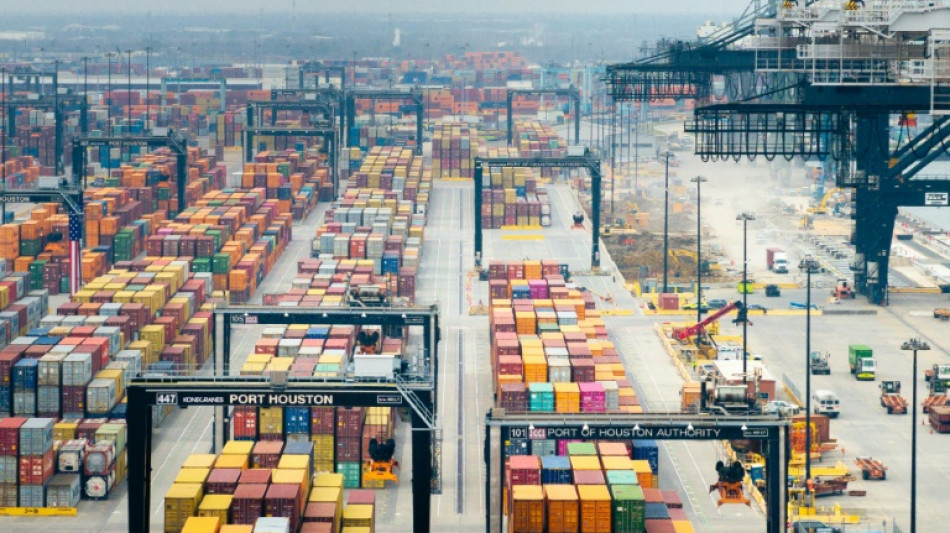
-
 Sainz opts out of race for FIA presidency
Sainz opts out of race for FIA presidency
-
Shamar Joseph rips through Australia top order in first Test

-
 Court rejects EDF complaint over Czech nuclear tender
Court rejects EDF complaint over Czech nuclear tender
-
Mbappe returns to Real Madrid training at Club World Cup

-
 Kenya anniversary protests turn violent, 8 dead
Kenya anniversary protests turn violent, 8 dead
-
Elliott double fires England into Under-21 Euros final

-
 Trans campaigners descend on UK parliament to protest 'bathroom ban'
Trans campaigners descend on UK parliament to protest 'bathroom ban'
-
New York mayoral vote floors Democratic establishment

-
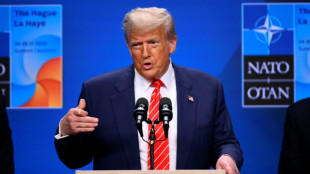 Trump claims 'win' as NATO agrees massive spending hike
Trump claims 'win' as NATO agrees massive spending hike
-
EU probes Mars takeover of Pringles maker Kellanova

-
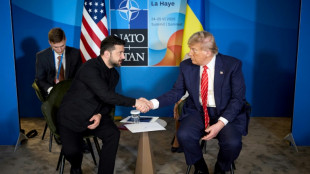 Sidelined Zelensky still gets Trump face time at NATO summit
Sidelined Zelensky still gets Trump face time at NATO summit
-
Mexico president threatens to sue over SpaceX rocket debris

-
 Amazon tycoon Bezos arrives in Venice for lavish wedding
Amazon tycoon Bezos arrives in Venice for lavish wedding
-
Shamar Joseph gives West Indies strong start against Australia

-
 Raducanu's Wimbledon build-up hit by Eastbourne exit
Raducanu's Wimbledon build-up hit by Eastbourne exit
-
RFK Jr.'s vaccine panel opens amid backlash over fabricated study
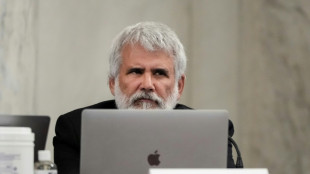
-
 'You try not to bump into things:' blind sailing in Rio
'You try not to bump into things:' blind sailing in Rio
-
Trump says 'three or four' candidates in mind for Fed chief
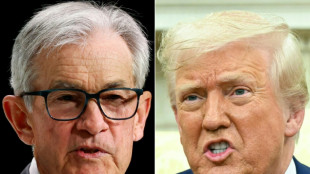
-
 Trump teases Iran talks next week, says nuclear programme set back 'decades'
Trump teases Iran talks next week, says nuclear programme set back 'decades'
-
Turkey tussles with Australia to host 2026 UN climate talks

-
 Bielle-Biarrey 'fit' for Top 14 final after suffering concussion
Bielle-Biarrey 'fit' for Top 14 final after suffering concussion
-
James Webb telescope discovers its first exoplanet

-
 Kenya's Kipyegon seeks history with four minute mile attempt
Kenya's Kipyegon seeks history with four minute mile attempt
-
Gunmen kill 10 in crime-hit Mexican city

-
 Olympic surfing venue battling erosion threat
Olympic surfing venue battling erosion threat
-
Relief, joy as Israel reopens after Iran war ceasefire

-
 Spain upholds fine against Rubiales for Hermoso forced kiss
Spain upholds fine against Rubiales for Hermoso forced kiss
-
Iran hangs three more accused of spying as fears grow for Swede

-
 Australia choose to bat first in first Test against West Indies
Australia choose to bat first in first Test against West Indies
-
Gambhir backs India bowlers to 'deliver' despite first Test misery

-
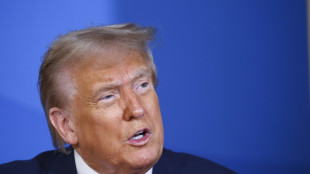 Trump reassures allies as NATO agrees 'historic' spending hike
Trump reassures allies as NATO agrees 'historic' spending hike
-
England's Duckett says mindset change behind Test success

-
 Trump sees 'progress' on Gaza, raising hopes for ceasefire
Trump sees 'progress' on Gaza, raising hopes for ceasefire
-
UK's Glastonbury Festival opens gates amid Kneecap controversy

-
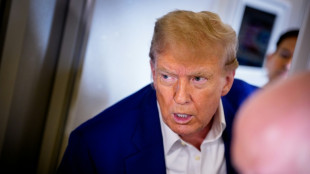 Oil rebounds as markets track Iran-Israel ceasefire
Oil rebounds as markets track Iran-Israel ceasefire
-
Cable theft in north France disrupts Eurostar traffic

-
 Cambodians at quiet Thai border plead for peace
Cambodians at quiet Thai border plead for peace
-
Trump plays nice as NATO eyes 'historic' spending hike
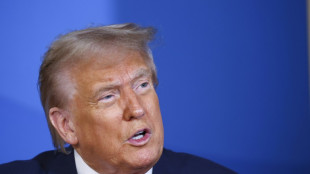
-
 Barcelona announce Camp Nou return for August 10
Barcelona announce Camp Nou return for August 10
-
Trump insists Iran nuclear programme set back 'decades'

-
 Armenia PM says foiled 'sinister' coup plot by senior cleric
Armenia PM says foiled 'sinister' coup plot by senior cleric
-
Turkey breathes easier as Iran-Israel truce eases fallout risk
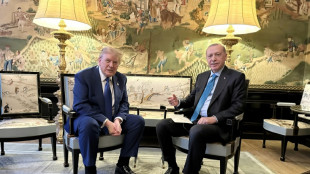
-
 Tesla sales skid in Europe in May despite EV rebound
Tesla sales skid in Europe in May despite EV rebound
-
'Not Test class': Pundits tear into India after England chase 371

-
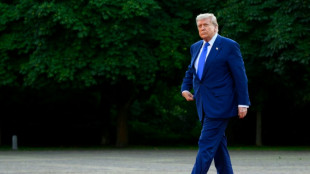 Trump whirlwind tests NATO summit unity
Trump whirlwind tests NATO summit unity
-
Justice orders release of migrants deported to Costa Rica by Trump

-
 Vietnam tycoon will not face death penalty over $27 bn fraud: lawyer
Vietnam tycoon will not face death penalty over $27 bn fraud: lawyer
-
Vietnam abolishes death penalty for spying, anti-state activities

-
 Over 80,000 people flee severe flooding in southwest China
Over 80,000 people flee severe flooding in southwest China
-
AI fakes duel over Sara Duterte impeachment in Philippines


US trade deficits at core of Trump tariff moves
Imposing punitive tariffs on countries with high trade surpluses with the United States has been at the heart of US President Donald Trump's economic policy.
Trump has lived up to his campaign pledges to resume his hardball trade diplomacy.
But analysts say trade imbalances can sometimes be the result of US policy itself.
- What is a trade deficit? -
A trade deficit occurs when a country's imports exceed its exports to another country. The balance is usually calculated on trade of goods such as cars, electronics, farm products or oil and gas, among other things.
International comparisons usually focus on goods but some analysts say trade in services -- such as financial systems, transports, tourism or communications services -- should also be taken into account to get the full picture.
The United States, for instance, has a large trade deficit with many of its partners when just considering goods, but once services are taken into account the overall imbalance is less.
"Politicians are obsessed with the material nature of physical goods," said Niclas Poitiers, a research fellow at Brussels' think tank Bruegel.
Poitiers noted that countries can't impose tariffs on services, hence Trump's insistence on focusing on goods.
- Who is Trump targeting? -
"We have deficits with almost every country -- not every country, but almost -- and we're going to change it," Trump vowed at the beginning of February, while announcing he would imposed fresh tariffs on Canada, Mexico and China.
The United States posted a goods trade deficit of $295 billion with China in 2024, $63 billion with Canada and $172 billion with Mexico, according to the US Department of Commerce.
While the tariffs on China were implemented, Trump agreed to delay those against Mexico and Canada.
With the European Union, the deficit reached $157 billion in 2023, according to the Eurostat data agency, driven by trade surpluses in Germany, Italy and Ireland.
Japan, South Korea and India are also among the 10 countries with the largest surpluses.
- Is the data reliable? -
The numbers should be dealt with carefully as calculations can vary from one country to the next depending on local accounting norms, the exchange rate used, or to what extent transportation costs are included.
Such inconsistencies mean that some countries can go from having a surplus to having a deficit. France, for instance, had a goods surplus of $14 billion in 2023, according to US statistics, but a deficit of $7 billion according to French customs.
There are differences within the European Union, too, where national figures can differ from those of the European Commission.
This is due the fact that US goods cleared through customs in the Netherlands, Germany or Belgium before being shipped to France, are registered by Eurostat as coming from these countries, French customs have said.
- Where do deficits come from? -
Trump has said that US partners have been taking advantage of the situation, but analysts argue that the reality is more complex with a number of factors playing a part.
"The dollar is at the top of the pile," said Elvire Fabry, a senior researcher in trade geopolitics at the Jacques Delors Institute, in Brussels.
The dollar's status as the world's preeminent reserve currency tends to push its value higher, but this makes American exports more expensive and less competitive for foreign buyers.
Low US savings rates -- at around five percent since the beginning of the 2000s, according to the Federal Reserve Bank of St. Louis -- encourages consumption, including imported goods.
Other factors are at play, such as China maintaining its currency at a low level, making its exports more competitive.
The type of goods manufactured in the United States also matters, said Fabry.
"If the United States can't export more American car brands, it's because they don't suit European consumption," where smaller cars prevail, Fabry said.
More broadly, there are questions on whether economic policy should be based on trade statistics alone.
"Bilateral trade deficits are not really meaningful," said Poitiers, taking the example of the way iPhones are manufactured.
"There are (iPhone) components that are manufactured in South Korea, these components are shipped from South Korea to China, where the stuff is assembled," Poitiers said.
They are then exported from China to the United States, showing up in both countries' bilateral trade, when Apple is an American company, he said.
E.Qaddoumi--SF-PST
